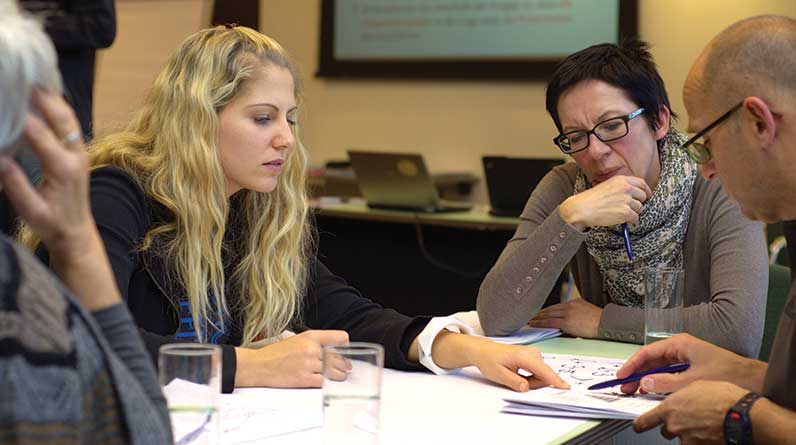
Understanding the Role of Mindsets in Team Building
“Teamwork makes the dream work,” as the saying goes. But what makes some teams thrive while others struggle to make progress?
One key factor is the mindset of the team members. Mindset is the collection of attitudes, beliefs, and mental models that shape how individuals approach their work and interact with others.
In building a successful team, it’s essential to cultivate a positive, growth-oriented mindset that can overcome challenges and adapt to changing circumstances.
In this article, we’ll cover how essential the mindset is in team building and offer strategies for fostering a perspective that can propel your team to success.
5 Strategies for Building Resilient and Adaptable Teams
When building a winning team, it is important to develop a game plan that all the members can follow, as well as being a blueprint to guide the team leader. Here are five strategies that will help the team leader develop a strong team.
- Encourage a Growth Mindset: Cultivate a team culture that values learning, improvement, and embracing challenges as opportunities for growth.
- Foster Psychological Safety: Create an environment where team members feel comfortable sharing ideas, taking risks, and voicing their concerns without fear of retribution.
- Develop Flexibility: Help team members develop the ability to adjust to changing situations and embrace new ways of working.
- Promote Collaboration: Encourage open communication, cooperation, and mutual support among team members to build trust and cohesion.
- Emphasize Positivity: Encourage a positive outlook among team members, focusing on solutions rather than problems and recognizing and celebrating successes while working on projects.
These five strategies are geared to strengthen each team member individually, as well as strengthening the team spirit as a whole.
The Impact of Mindset on Team Communication and Collaboration
Effective communication and collaboration are essential for any successful team, but team members’ mindsets can significantly impact how well they work together.
A positive attitude emphasizing openness, cooperation, and mutual support can foster effective communication and collaboration, while negative mindsets can hinder progress and lead to conflict.
One way mindset impacts team communication is through the willingness to share ideas and feedback. For example, team members with a growth mindset tend to be more open to giving and receiving feedback, seeing it as an opportunity for improvement.
On the other hand, team members with a fixed mindset may resist feedback, feeling that it challenges their competency or authority. This resistance can lead to communication breakdowns and a lack of collaboration.
Another way mindset affects team collaboration is through the willingness to take risks and experiment with new approaches. Team members with a growth mindset tend to be more willing to take calculated risks, try new ideas, and adapt to changing circumstances.
In addition, they are more likely to experiment with new approaches, even if uncertain about the outcome. This openness to experimentation can lead to new ideas and innovations that drive team success.
In contrast, team members with a fixed mindset may be more risk-averse, preferring to stick with what has worked in the past. As a result, they may be less willing to try new approaches or take on new challenges, fearing failure or looking bad in front of their peers.
This can lead to a lack of innovation and a reluctance to take the necessary risks to achieve team goals. Therefore, it’s essential to cultivate a growth mindset among team members to foster more effective communication and collaboration.
Promoting open communication, embracing feedback, and a culture of experimentation can help teams work together more effectively, building trust and mutual respect.
Team leaders should encourage their teams to engage in regular team-building activities promoting collaboration and communication. These activities can range from joint exercises to social events that allow team members to get to know each other personally.
By valuing and embracing the power of a team mindset, everyone can achieve greater success and overcome challenges together.
Identify and Overcome Negative Mindsets That Can Hinder Team Success
Negative mindsets can harm a team’s success, leading to communication breakdowns, conflicts, and a lack of collaboration. Therefore, identifying and overcoming negative attitudes is crucial to building a resilient and adaptable team to achieve its goals.
The first step in identifying negative mindsets is to become aware of them. Once you identify these negative mindsets, you can work on overcoming them. To identify negative mindsets, team leaders should pay attention to their team members’ behaviors, such as their language, body language, and attitudes toward work.
Negative attitudes can manifest in many ways, like a fixed mindset that resists change, a victim mentality that blames others for problems, or a fear-based perspective that avoids risks.
Team leaders should also encourage team members to provide feedback on how they perceive each other’s behaviors and attitudes.
To overcome negative mindsets, start by challenging your assumptions. Negative mindsets often stem from limiting beliefs and assumptions about yourself or others. By questioning these assumptions and challenging them with evidence, you can shift your perspective and adopt a more positive outlook.
It is also recommended to ask your team to do the same. Questioning and challenging their own assumptions often strengthens the bond between team members and co-workers.
Another strategy for overcoming negative mindsets is to reframe your thinking. Negative attitudes often focus on problems rather than solutions, which can be self-defeating. Reframing your thinking to focus on opportunities and solutions can help you overcome negative mindsets and achieve your goals.
Finally, it’s essential to practice self-compassion when dealing with negative mindsets. Negative mindsets can be deeply ingrained, and it can be challenging to shift them overnight. However, practicing self-compassion, acknowledging that change takes time, and celebrating small wins can help you stay motivated and committed to overcoming negative mindsets.
Identifying and overcoming negative mindsets can lead to tremendous success. Of course, it takes effort and commitment to change negative mindsets, but with the right attitude and strategies, it is possible to overcome them and achieve your goals as a team.
Putting Positive Mindset into Action for Team Success
A positive mindset is a powerful thing, but it’s not enough on its own to guarantee team success. To achieve actual results, that positive mindset must be translated into action. Here are some practical steps to take to put your team’s positive mindset into action:
- Lead by example: As a team leader, you must model the behaviors and attitudes you want to see in your team. Be positive, proactive, and solution-focused in your approach.
- Communicate clearly and consistently: Effective communication is vital for successful teams. Ensure everyone understands their roles and responsibilities, and encourage open, direct, sincere, and honest communication among team members.
- Foster collaboration and teamwork: Encourage teamwork and collaboration within your team. This can be achieved through team-building exercises, shared goals, and regular check-ins.
- Set achievable goals and celebrate successes: Establish realistic goals for your team and celebrate their accomplishments. This creates a positive and motivating environment and encourages everyone to keep pushing forward.
- Identify and address negative mindsets: Keep an eye out for negative attitudes within your team, and take steps to address them. This could include coaching and mentoring, individual feedback sessions, or team-wide training on mindset and positivity.
Incorporating these steps, you can help your team progress from a positive mindset to positive action and, ultimately, to success. Every successful team leader, coach and mentor will confirm that the emotional reward for guiding their team to success and victory is second to none.
Remember, building a successful team takes time, effort, and commitment, but anything is possible with the right mindset and approach.


